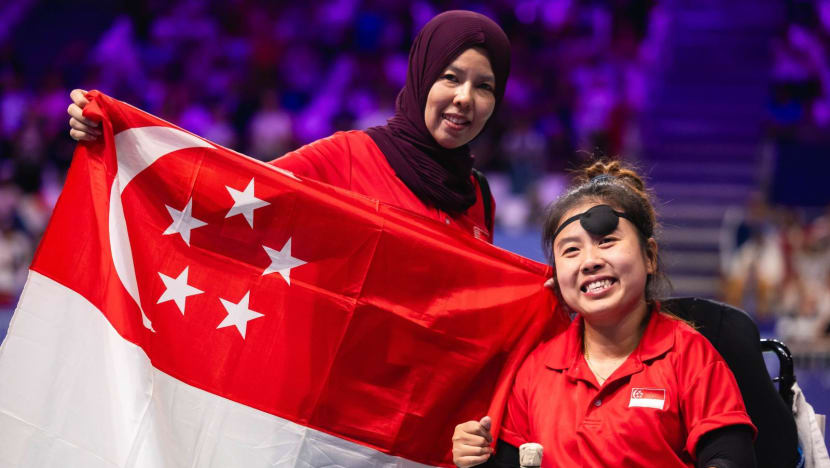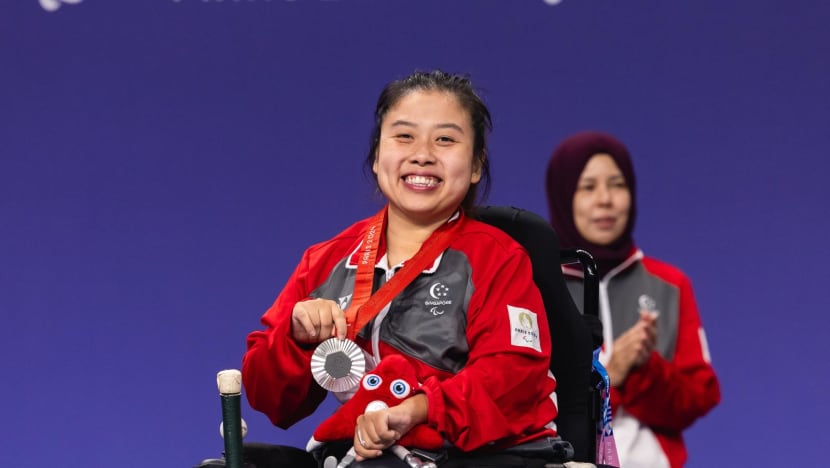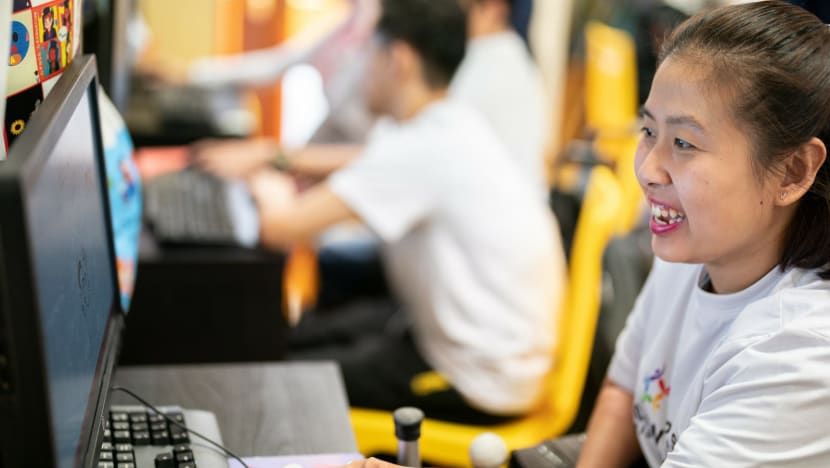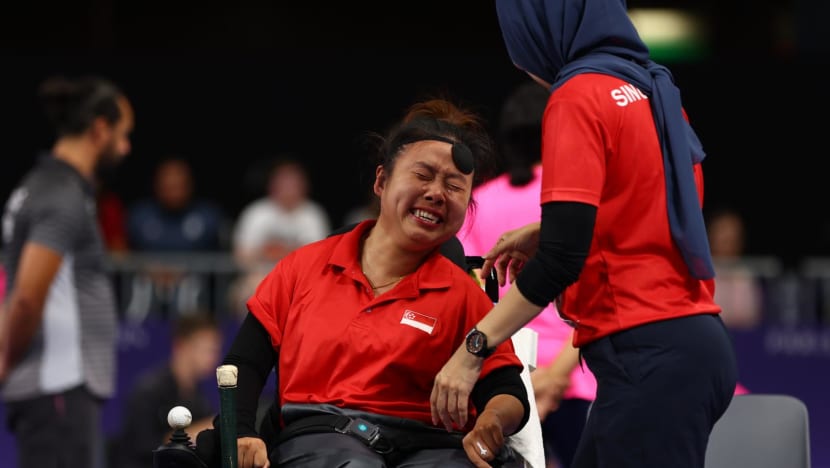'We're like family': How a special bond helped Singapore's Jeralyn Tan to a historic Paralympic medal
Yurnita Omar has been coaching her in boccia since 2016.

Yurnita Omar, coach of Singapore's boccia player Jeralyn Tan, poses with the Singapore flag after Tan's finals match against France’s Aurelie Aubert on Sep 2, 2024, at the Paris Paralympics. (Photo: SNPC)

This audio is generated by an AI tool.
SINGAPORE: Over the years, they have travelled together, eaten together and on some occasions, bunked together.
It is a bond extending beyond that of just a typical coach and athlete.
And while Yurnita Omar has four children of her own, her boccia apprentice Jeralyn Tan is just as much kin.
"We're not just like friends, we're like family," Yurnita told CNA. "She can tell me everything - from boccia, to her family, to her feelings. Everything.
"From one look on her face, I know what she is going through ... that's how close we are."
On Monday (Sep 2), Tan clinched a historic boccia silver at the Paris Paralympics. This was Singapore's very first medal in the sport.
The 35-year-old, who has cerebral palsy, became Singapore's fourth Paralympic medallist, joining swimmers Yip Pin Xiu and Theresa Goh as well as equestrienne Laurentia Tan in the history books.
What is boccia?
Boccia, which means to bowl in Italian, is a sport played by athletes in wheelchairs.
Players compete in four different categories, based on their level of physical impairment. For example, BC1 athletes like Tan are allowed to have assistance.
Players are required to throw or release balls towards a white target ball called a jack.
The aim is to land their ball as close as possible to the target, or to knock the opponent's ball out of the way.
Each player takes their turn to do this, and at the end of each round, the athlete whose ball is the closest to the jack scores one point.
He or she also receives an additional point for every ball that sits closer to the jack than their opponent’s closest ball.
At the end of four rounds, the player with the most points wins.

Because Tan's BC1 class allows her to receive assistance, Yurnita acts as not only her coach but also as her assistant or competition partner during matches.
Competition partners can help to hold a player's wheelchair steady, adjust it, and prepare the ball for the player's next throws.
They cannot give players any instructions during the four rounds. They can only do so during a one minute interval between rounds.
During these 60 seconds, competition partners can also help with changes to strategy and even provide emotional support to the athlete, said Yurnita.
NEVER GIVING UP
Tan picked up the sport as a co-curricular activity in 2008, when she was a student at the Cerebral Palsy Alliance Singapore (CPAS) School.
She met Yurnita a few years later, while the latter was volunteering as a ramp assistant for former Paralympian Toh Sze Ning, who competed in the BC3 category.
Tan saw a "friendly coach" in Yurnita, who works at CPAS as an executive in the alumni adult services department.
She also manages the digital art alumni programme which Tan attends.
The pair started working together in 2016, when Yurnita transferred to Tan's BC1 class.
At the time, Tan already stood out for her potential, said the coach, describing her as gentle and appreciative of "simple pleasures".

But what's special about Tan is that no matter how hard she's pushed, she always perseveres, said Yurnita. "That's what also keeps me coming back."
Tan went on to represent Singapore in 2020, winning the World Boccia Asia-Oceania Regional Championship the next year.
After clinching two World Boccia Cup titles in 2023, the current world No 2 retained her BC1 crown in Montreal, Canada, earlier this year.
"WE WERE BROKEN-HEARTED"
But before making history at the Paralympics, the pair had to overcome major disappointment.
At the World Boccia Cup in Portugal in July, the three-time champion was eliminated in the quarter-finals.
"We were broken-hearted ... we were so crushed," recalled Yurnita.
"We came together and discussed and changed things. We knew that it was going to be difficult, it was going to be tiring, but we did it."
The pair tweaked their schedule to increase training volume, and also changed Tan's game approach to a more "aggressive" one.
Tan said that what differentiates Yurnita from other coaches is her willingness to innovate and change things up.
'That loss was a blessing in disguise ... Without that loss, we wouldn't have made a lot of changes," said Yurnita.
"The key takeaway is that we cannot give up."

The sport might appear easy, but there's more to it than just throwing balls, Yurnita added.
Boccia balls can be made of different materials, and the flooring of each competition venue can be different as well. This can lead to variations and different outcomes of throws, she explained.
So coach and athlete both analyse matches and collate data to help performance. "She watches and (takes down) the data. I prepare the excel sheets for her," said Yurnita.
As their Paris Paralympics outing demonstrated, they have built a bond that's produced sporting success and more.
"She always guides me to training every day," said Tan. "It is important (to have her around)."
They also have left a mark on many Singaporeans, with Yurnita receiving many messages of congratulations after Tan's Paris semi-final victory over Japan's Hiromi Endo.
"I heard there were even people out there (who) cried and teared," said the coach. "I didn't know that her game (touched) so many hearts."
















